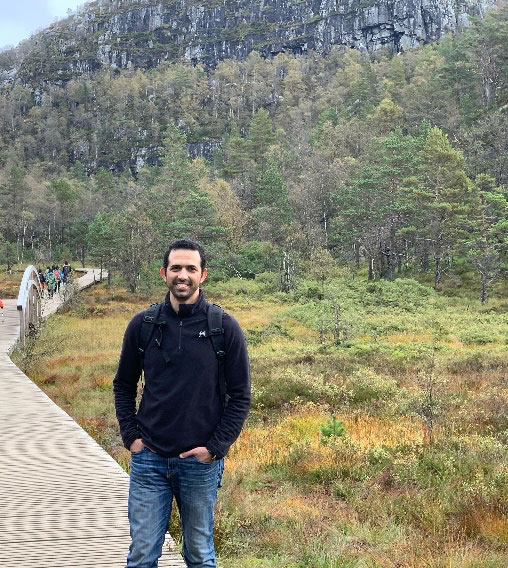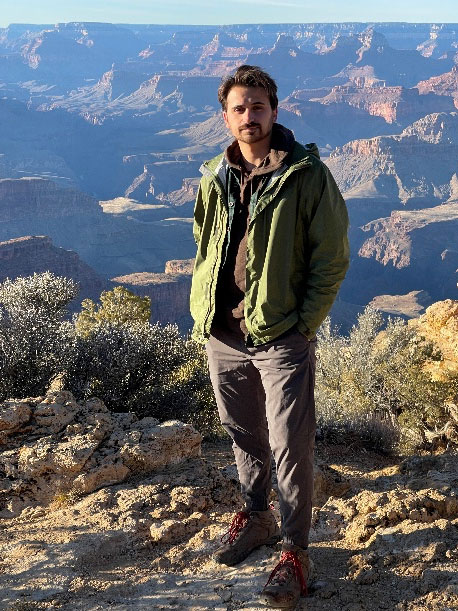Publication Charge Grants
Publication Charge grants are intended to help Rocky Mountain geoscientists offset costs for publication. The costs can include page charges, color charges, and or open-access charges for articles relevant to Rocky Mountain geoscience.
Grants are awarded by the Trustees either as part of the scholarship award process or on a standalone application.
For 2025, two Publication Grant were awarded to:

Ahmed M. Ahmed, PhD Candidate, Geophysics, Colorado School of Mines
The title of Ahmed’s dissertation is “Efficient multiparameter estimation for seismic reservoir monitoring using multitask and transfer learning.” He will use recent advances in computational geophysics and artificial intelligence to solve complex nonlinear inverse problems of reservoir monitoring. He plans to leverage advanced deep learning techniques like CNNs (Computational Neural Networks), MTL (Multitask Learning), and TL (Trained Learning) to accurately predict relevant reservoir parameters from subsurface seismic data. CNNs are used to estimate the P-wave velocity from 2D multicomponent seismic data and then are fine-tuned through TL to obtain the S-wave velocity, density, and saturation. With TL, CNNs are trained for one task, which provides the starting point for transferring the learning to a second task. When using MTL, CNNs can be trained simultaneously on multiple related tasks by taking advantage of their commonalities. The models are pretrained on a 2D seismic line and can be adapted to predict the reservoir parameters. He is hoping to answer the following questions:
- How does MTL with multiple encoder and decoder CNN architectures help capture complex geospatial relationships?
- How can we incorporate MTL and TL into CNNs to improve the prediction of multiple reservoir parameters?
- How can we repurpose a TL model that is developed for one task to perform another related task to reduce the need for large, labeled data sets and computational cost?
Ahmed’s work is under the direction of Dr. Ilya Tsvankin.
Ahmed has an MS in Data Science from the Colorado School of Mines and a MS in Geophysics from Cairo University, Egypt.

Matthew Musso, PhD Candidate, Geology, Colorado School of Mines
The title of Matthew’s dissertation is “Crinoidal sediment generation, transport, and preservation: implications for the encrinite rock record.” Matthew’s research will focus on stalked crinoids as sediment producers, the hydrodynamic behavior of their skeletal sediment and crinoidal bedforms found in Mississippian-age outcrops. His research aims to link crinoid grain properties with the emplacing flow. Initially, physical experiments will be performed using modern crinoid specimens to investigate how the organism dissociates after death and observe the size distribution of the grains produced by a single organism. Next, experiments will be carried out to better understand the hydrodynamic aspects of crinoidal grain types, including settling velocity, entrainment threshold, and transportation mode in bedload or suspension. Improved understanding of the physical properties of crinoidal sediments and their hydrodynamic behavior in a variety of flow types will lead to more accurate assessments of basin fill history, improved hydrocarbon and mineral deposit exploration and evaluation of climate indicators.
Matt’s work is under the direction of Dr. Lesli Wood
David has a MS in Geology from the Colorado School of Mines and a BS in Geology from Lafayette College
Standalone Grant Application Guidelines:
- Authors must submit proof of publication and an invoice for charges in a credible journal.
- Valid charges are page charges, color charges, and/or Open Access charges
- Requests will be considered on a case-by-case basis and grants will be offered at the sole discretion of the Trustees of the RMAG Foundation
- The Grant amount will be at the sole discretion of the Trustees of the RMAG Foundation
Grant Requests must include the following:
- Article title and authors’ names
- Publication, journal or book name
- Summary of new and unique information disseminated in this publication as it relates to Rocky Mountain geosciences (300-500 words maximum)
- Estimated publication date
- The grantee agrees to Provide one copy of the publication to the RMAG Foundation
- The grantee agrees that the publication name, article title and author(s) name(s) be published for publicity purposes on the following:
- RMAG Foundation website
- RMAG Outcrop newsletter article
- Slides promoting the Foundation at RMAG functions
Grant Request Submission:
Submit grant requests via email to rmagfoundation@gmail.com
